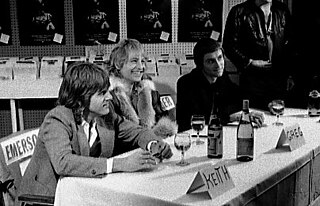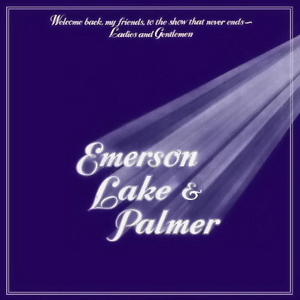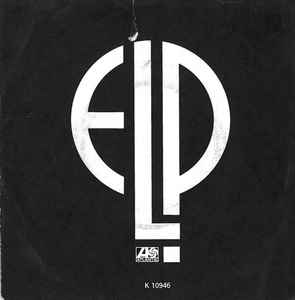
Emerson, Lake & Palmer were an English progressive rock supergroup formed in London in 1970. The band consisted of Keith Emerson (keyboards) of the Nice, Greg Lake of King Crimson, and Carl Palmer of Atomic Rooster. With nine RIAA-certified gold record albums in the US, and an estimated 48 million records sold worldwide, they are one of the most popular and commercially successful progressive rock groups of the 1970s, with a musical sound including adaptations of classical music with jazz and symphonic rock elements, dominated by Emerson's flamboyant use of the Hammond organ, Moog synthesizer, and piano.

Keith Noel Emerson was an English keyboardist, songwriter, composer and record producer. He played keyboards in a number of bands before finding his first commercial success with the Nice in the late 1960s. He became internationally famous for his work with the Nice, which included writing rock arrangements of classical music. After leaving the Nice in 1970, he was a founding member of Emerson, Lake & Palmer (ELP), one of the early progressive rock supergroups.

Tarkus is the second studio album by English progressive rock band Emerson, Lake & Palmer, released on 14 June 1971 on Island Records. Following their debut tour across Europe during the second half of 1970, the group paused touring commitments in January 1971 to record a new album at Advision Studios in London. Greg Lake produced the album with Eddy Offord as engineer.

Brain Salad Surgery is the fourth studio album by English progressive rock band Emerson, Lake & Palmer, released on 7 December 1973 by their new record label, Manticore Records, and distributed by Atlantic Records.

Works Volume 1 is the fifth studio album by English progressive rock band Emerson, Lake & Palmer, released as a double album on 25 March 1977 on Atlantic Records. Following their world tour supporting Brain Salad Surgery (1973), the group took an extended break before they reconvened in 1976 to record a new album. They were now tax exiles and recorded new material in London and overseas in Montreux, Switzerland and Paris, France. Works Volume 1 features a side dedicated for each member to write and arrange their own tracks, while the fourth side features songs performed collectively. Keith Emerson recorded his Piano Concerto No. 1, Greg Lake wrote several songs with lyricist Peter Sinfield, and Carl Palmer recorded tracks of varied musical styles.

Gregory Stuart Lake was an English musician, singer, and songwriter. He gained prominence as a founding member of the progressive rock bands King Crimson and Emerson, Lake & Palmer (ELP).

Carl Frederick Kendall Palmer is an English drummer best known as a founding member of the supergroups Emerson, Lake & Palmer, Asia and sometimes Acoustic Alchemy. He has toured with his own bands since 2001, including Palmer, the Carl Palmer Band, and currently, Carl Palmer's ELP Legacy. He previously was a touring drummer for The Crazy World of Arthur Brown and a founding member of Atomic Rooster.

Welcome Back, My Friends, to the Show That Never Ends – Ladies and Gentlemen is the second live album by the English progressive rock band Emerson, Lake & Palmer, released as a triple album in August 1974 on Manticore Records. It was recorded in February 1974 at the Anaheim Convention Center in Anaheim, California, during the group's 1973–74 world tour in support of their fourth studio album, Brain Salad Surgery (1973).

Emerson, Lake & Palmer is the debut studio album by English progressive rock band Emerson, Lake & Palmer. It was released in the United Kingdom by Island Records in November 1970, and in the United States by Cotillion Records in January 1971. After the group formed in the spring of 1970, they entered rehearsals and prepared material for an album which became a mix of original songs and rock arrangements of classical music. The album was recorded at Advision Studios in July 1970, when the band had yet to perform live. Lead vocalist and bassist/guitarist Greg Lake produced it.

Love Beach is the seventh studio album by English progressive rock band Emerson, Lake & Palmer. It was released on 17 November 1978 by Atlantic Records as their final studio album released prior to their split in the following year. By the end of their 1977–1978 North American tour internal relations had started to deteriorate, but the group were contractually required to produce one more album. They retreated to Nassau, Bahamas as tax exiles to record Love Beach with lyricist Peter Sinfield who is credited as a co-writer of each track. After Greg Lake and Carl Palmer had finished recording their parts they left the island, leaving Keith Emerson to finish the album himself.

Emerson, Lake and Palmer in Concert is a live album by Emerson, Lake & Palmer (ELP), recorded at their 26 August 1977 show at the Olympic Stadium, Montreal, Quebec, Canada which is featured on the album cover. It was released by Atlantic Records in November 1979, following ELP's breakup. It was later re-released and repackaged as Works Live in 1993. Some of the tracks were not from the Montreal concert, but from other concerts during their 1977–1978 tour, such as "Peter Gunn" and "Tiger in a Spotlight".

Emerson, Lake & Powell, sometimes abbreviated as ELP, were an English progressive rock band, considered by many as a variant lineup of Emerson, Lake & Palmer, that released one official studio album in 1986. The album's debut single was "Touch and Go," which peaked at number 60 on the Billboard charts on 19 July 1986.

In the Hot Seat is the ninth and final studio album by English progressive rock band Emerson, Lake & Palmer, released on 27 September 1994 by Victory. Recorded at Goodnight L.A. Studios in Los Angeles, it was produced by Keith Olsen.
"Karn Evil 9" is an extended work by progressive rock group Emerson, Lake & Palmer, appearing on the album Brain Salad Surgery. A futuristic fusion of rock and classical themes, it was written by band members Keith Emerson and Greg Lake with former King Crimson lyricist Peter Sinfield. It is the fifth and final track on Brain Salad Surgery and, with a running length of 29 minutes and 37 seconds, is Emerson, Lake & Palmer's longest studio recording. The initial release of the album on vinyl split "Karn Evil 9" between the two sides due to its length, with a fade out/fade in between First Impression Parts 1 and 2.

King Biscuit Flower Hour: Greatest Hits Live is a compilation live album by the progressive rock supergroup Emerson, Lake & Palmer. It features tracks from two different tours: The 1973–1974 Brain Salad Surgery Tour, and the 1977 Works Tour.

The discography of Emerson, Lake & Palmer, an English progressive rock band, includes 9 studio albums, 24 live albums, 12 compilation albums and 17 singles.

"Fanfare for the Common Man" is an instrumental piece of music adapted and played by the English progressive rock band Emerson, Lake & Palmer, from the group's 1977 Works Volume I album. Adapted by Keith Emerson from Aaron Copland's 1942 piece of the same name, it is one of their most popular and enduring pieces.

"Right Place, Wrong Time" is a song by American musician Dr. John. It was the first single from his sixth album, In the Right Place, and became his biggest hit single.
"Still...You Turn Me On" is a song by the progressive rock band Emerson, Lake & Palmer. It was released on their 1973 album Brain Salad Surgery. It is the only song on the album that lead singer and guitarist Greg Lake wrote entirely by himself.
"Tiger in a Spotlight" is a song by the progressive rock band Emerson, Lake & Palmer. It was recorded in 1973, but not released until 1977, when it was released on the album Works Volume 2. "Tiger in a Spotlight" was released as a single in Germany, and was added to the setlist for the 1978 tour.
















